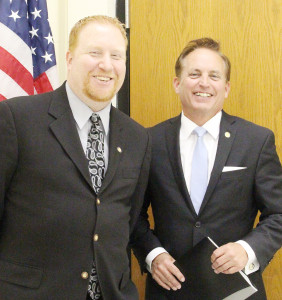Bill establishes a confidential address to protect victims of domestic abuse and assault
~by Lora Koch, The Scranton Journal
 Iowa Secretary of State Paul Pate (right) and state communications specialist Kevin Hall (left) recently held local meetings, including one in Guthrie County, to announce House passage of the Safe at Home Act. The bill, House File 585, received unanimous approval from the legislators and is expected to receive Senate approval and the Governor’s signature before May.
Iowa Secretary of State Paul Pate (right) and state communications specialist Kevin Hall (left) recently held local meetings, including one in Guthrie County, to announce House passage of the Safe at Home Act. The bill, House File 585, received unanimous approval from the legislators and is expected to receive Senate approval and the Governor’s signature before May.
The Safe at Home Act establishes an address confidentiality program that protects victims of domestic abuse, sexual assault, trafficking, and stalking by keeping their home address private. Participants receive a new legal address to be used for all official purposes. Their actual home address will not be included on public records, such as voter registration and absentee ballot lists.
“This bill is way past due in Iowa,” said Pate. “We are giving people back their safety and opportunity to become active again in our society. Victims of these types of crimes are often forced to become reclusive. The Safe at Home Act provides them an opportunity to retake part of their lives.”
During the meeting, Pate explained the need for this type of program in every county in Iowa, including Greene County. “From January 1, 2010 through March 2015, there were 51 domestic abuse convictions in Greene County. This program is just one tool or resource to help victims stay safe.”
Currently there are 33 states with Safe at Home programs. In Minnesota, there are about 2,000 participants enrolled, and in Kansas about 500.
City, county, and state offices, such as city clerks, county clerks, county treasurers, schools, the Department of Transportation, the Department of Human Services, and other similar offices will be required to accept the substitute address. Private organizations requiring a mailing address must also accept the substitute address as the participant’s legal address. The confidential address does not apply to real estate records.
This program does not have a fee or cost for the participants, and will be funded through a $100 surcharge imposed on persons convicted of domestic abuse and a $50 surcharge on violations of protective orders.
“One of the most important things we can offer is a basic human right to be safe,” said Pate. “We also want public awareness that domestic abuse is still an issue.” ~The Scranton Journal
